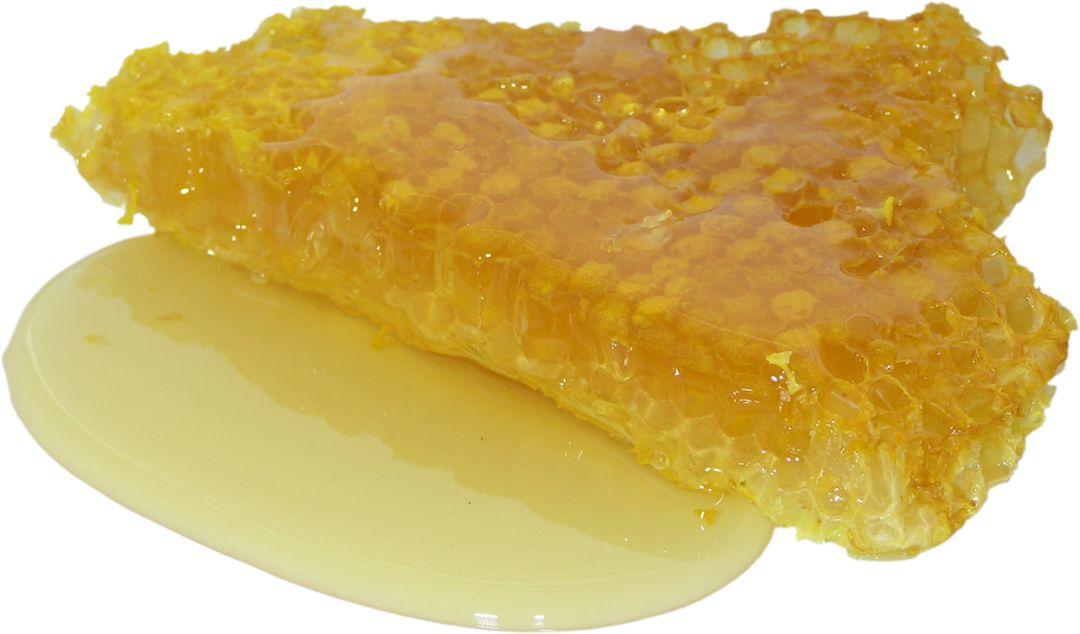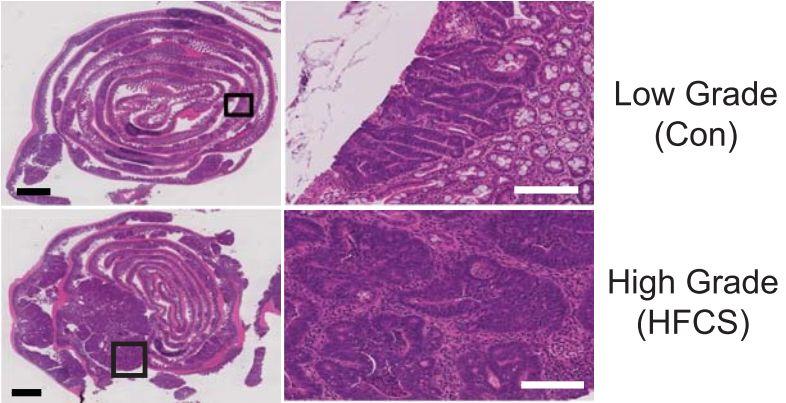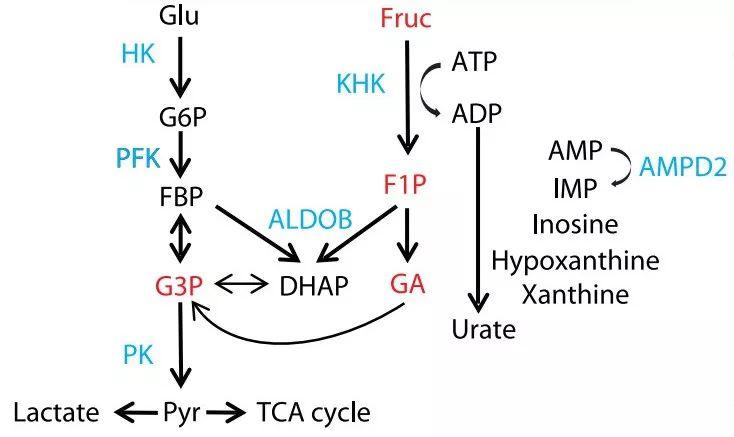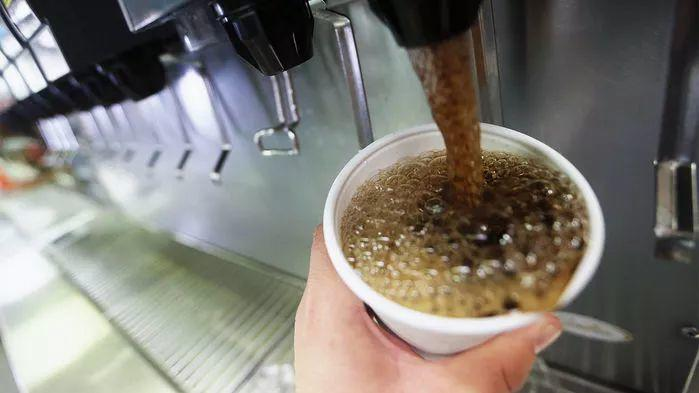饮料中的糖浆可直接促进肠癌生长
- 糖吃多了有害健康这事,不用奇点糕说大家也知道。上回奇点糕就介绍过,血糖高了后,胰岛β细胞变得千疮百孔,大量泄漏ATP,在高血糖中被活活饿死。
- 那么,如果控制住了体重和血糖,是不是吃糖就没啥危害了呢?这恐怕想的太美了。
- 今天,康奈尔医学院的Marcus Goncalves、Lewis Cantley和Jihye Yun等研究发现,大致相当于每天一罐可乐剂量的玉米糖浆,就可以明显促进小鼠结肠肿瘤的生长。更可怕的是,这些糖直接从肠道中被肿瘤吸收,不经过血液,糖耐量再好也没用。相关研究发表在Science上[1]。
- 不过研究人员也发现,阻断果糖的代谢或脂肪酸从头合成就可以阻止这一过程,这或许可以成为控制肿瘤的新方法。

- 通讯作者之一的Jihye Yun
- 酸甜苦辣咸五味,受众最广的恐怕就是甜味了。糖类的甜味确实让人愉悦,让人上瘾,产生依赖性,甚至会有戒断反应[2],被有些人称为使用最广泛的“毒品”。
- 为了获取甜味,人们可是费劲了周折,从远古时摘野果采野蜜,到后来种甘蔗养蜜蜂,直到哥伦布发现美洲后,新大陆广泛种植甘蔗,才让甜味成为人们餐桌上的常客。而后工业化生产的转化糖浆,让甜味真正成为一种廉价的快乐来源[3]。

- 蜂蜜其实跟玉米糖浆差不多,主要成分都是一半果糖一半葡萄糖
- 转化糖浆通常以玉米淀粉为原料,先水解成葡萄糖,再用转化酶把其中大约一半的葡萄糖转化成果糖,毕竟果糖可比葡萄糖甜多了[4]。因为其中主要成分是果糖和葡萄糖,主要原料是玉米,也被称为果葡糖浆或者玉米糖浆。
- 自20世纪80年代,以玉米糖浆为原料的可乐等各种饮料在世界上流行开来后,肥胖率和结直肠癌的发病率也跟着上涨了[5]。这里面,含糖饮料造成的肥胖,就是一个肠癌的危险因素[6]。不过这些含糖饮料的摄入,会不会还对肠癌的发生发展有着直接的影响?研究人员们展开了研究。

- 大规模种植的玉米让玉米糖浆有了廉价的原料
- 研究人员使用敲除了APC基因的结肠癌模型小鼠,在用药物诱发肠癌后,每天给小鼠喂食400μL的25%玉米糖浆溶液,这大概相当于人们每天喝一罐350mL的可乐的量,远不足以让小鼠肥胖和代谢紊乱。
- 虽说喝了玉米糖浆的小鼠并没有出现肥胖等症状。8周后,虽然它们肠道中产生的肿瘤总数并没有增多,但其中的大肿瘤和高级别肿瘤数量都明显多于对照组。
- 玉米糖浆促进了肿瘤生长!

- 玉米糖浆促进了肿瘤的生长
- 玉米糖浆里主要有葡萄糖和果糖。这里面,果糖在小肠主要由转运体GLUT5被动运输[7],吸收效率十分有限。对人来说,一次性吃下5g左右的果糖,就能达到小肠的吸收上限,造成结肠内果糖浓度的升高[8]。而在这些服用了玉米糖浆的小鼠的结肠腔中,也确实出现了果糖浓度的升高。
- 进一步对肿瘤的研究发现,这些肿瘤中,吸收果糖用的GLUT5表达水平增高了,代谢果糖的己酮糖激酶(KHK)和醛缩酶B的表达也升高了。同位素示踪试验也显示肿瘤截流利用了不少果糖。

- 葡萄糖和果糖的代谢
- 在肿瘤中,果糖先是在KHK催化下磷酸化成果糖-1-磷酸(F-1-P),然后由醛缩酶B裂解成两个丙糖,或进入糖酵解氧化分解,或被用于合成葡萄糖和脂肪酸。
- 更重要的是,葡萄糖糖酵解的限速酶磷酸己糖激酶(HKs),受到ATP的负反馈抑制,而代谢果糖的KHK却没有这一机制。这也就使得,只要有足够的果糖,就会不断的生成F-1-P,超过醛缩酶B的代谢能力,造成F-1-P的堆积和ATP的耗竭。
- ATP消耗光了,对磷酸己糖激酶的抑制解除了,葡萄糖的糖酵解大大增加。
- 糖酵解对肿瘤细胞来说,可不仅仅是提供能量这么简单,它同时也为肿瘤细胞极为依赖的脂肪酸从头合成提供原料。
- 试验中,研究人员也发现,饲喂葡萄糖+果糖后,相比单独喂食葡萄糖,小鼠肿瘤中脂肪酸的合成增加了。而在小鼠中敲除的负责果糖代谢的KHK,或者负责脂肪酸从头合成的脂肪酸合酶(FASN),都可以阻止果糖的促癌生长作用。
- 更重要的是,葡萄糖糖酵解的限速酶磷酸己糖激酶(HKs),受到ATP的负反馈抑制,而代谢果糖的KHK却没有这一机制。这也就使得,只要有足够的果糖,就会不断的生成F-1-P,超过醛缩酶B的代谢能力,造成F-1-P的堆积和ATP的耗竭。
- 更重要的是,葡萄糖糖酵解的限速酶磷酸己糖激酶(HKs),受到ATP的负反馈抑制,而代谢果糖的KHK却没有这一机制。这也就使得,只要有足够的果糖,就会不断的生成F-1-P,超过醛缩酶B的代谢能力,造成F-1-P的堆积和ATP的耗竭。

- 这么一杯大约是220mL,比实验中的用量换算到人身上少点
- 论文通讯作者Cantley表示:“这项研究揭示了一个令人惊讶的结果,结直肠癌利用玉米糖浆作为促进肿瘤生长的燃料。玉米糖浆是大多数含糖苏打饮料和许多其他加工食品中的主要成分。虽然许多研究都将结直肠癌发病率的增加与饮食联系起来,但这项研究显示了食糖与结直肠癌之间的直接分子机制。”
- 另一位通讯作者Jihye Yun补充道:“我们的发现也为治疗开辟了新的可能性。与葡萄糖不同,果糖对正常细胞的存活和生长并不是必需的,这表明针对果糖代谢的治疗方法值得探索。另外,尽量避免饮用含糖饮料,而不是依赖药物控制血糖,会显著降低结肠中的糖含量。”
- 炸鸡能吃出肠癌,可乐也能喝出肠癌,这让肥宅奇点糕如何是好。还是做个肠镜去吧。
- 编辑神叨叨”
- 一罐350mL的可乐含糖37g,按其中一半是果糖算也得有18g果糖了,远超过了小肠吸收上限的5g,不过奇点糕还是选择快乐~”
- 真香.jpg”
- 参考文献:
- 1. GONCALVES M D, LU C, TUTNAUER J, et al. High-fructose corn syrup enhances intestinal tumor growth in mice[J]. Science, 2019, 363(6433): 1345-1349.”
- 2. Colantuoni C, Rada P, McCarthy J, et al. Evidence that intermittent, excessive sugar intake causes endogenous opioid dependence[J]. Obesity research, 2002, 10(6): 478-488.
- 3. Tappy L, Lê K A. Metabolic effects of fructose and the worldwide increase in obesity[J]. Physiological reviews, 2010, 90(1): 23-46.
- 4. Schiffman S S, Sattely–Miller E A, Graham B G, et al. Effect of temperature, pH, and ions on sweet taste[J]. Physiology & Behavior, 2000, 68(4): 469-481.
- 5. Hodge A M, Bassett J K, Milne R L, et al. Consumption of sugar-sweetened and artificially sweetened soft drinks and risk of obesity-related cancers[J]. Public health nutrition, 2018, 21(9): 1618-1626.
- 6. Bardou M, Barkun A N, Martel M. Obesity and colorectal cancer[J]. Gut, 2013, 62(6): 933-947.
- 7. Drozdowski L A, Thomson A B R. Intestinal sugar transport[J]. World journal of gastroenterology: WJG, 2006, 12(11): 1657.
- 8. Rumessen J J, Gudmand-Høyer E. Absorption capacity of fructose in healthy adults. Comparison with sucrose and its constituent monosaccharides[J]. Gut, 1986, 27(10): 1161-1168.
- 本文作者 | 孔劭凡
“健康还是快乐,这是一个问题”




